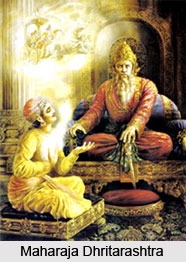 Sanjaya is a mythical character in the Indian epic Mahabharata. Sanjaya is the minister and charioteer of Maharaja Dhritarashtra. He was sent on an embassy to the Pandavas. Sanjaya`s purpose was to induce the Pandavas to return to Hastinapur, without giving them any distinct pledge that their authority would be restored to them. Sanjaya was surprised at the greatness of their preparations for war.
Sanjaya is a mythical character in the Indian epic Mahabharata. Sanjaya is the minister and charioteer of Maharaja Dhritarashtra. He was sent on an embassy to the Pandavas. Sanjaya`s purpose was to induce the Pandavas to return to Hastinapur, without giving them any distinct pledge that their authority would be restored to them. Sanjaya was surprised at the greatness of their preparations for war.
The Pandavas received him in Council, and he delivered the message of the Maharaja to which Yudhisthira replied that whoever is wise would never give his consent to a war on trivial grounds. But the Kurukshetra war seemed to be inevitable it would be useless in them to humiliate themselves to the dust for the sake of concord. The Pandavas declared that they considered Dhritarashtra to be their Maharaja as he is a kind and benevolent, and averse to doing evil. But as his son Duryodhana is his contrary character and to keep in good terms with him, the Maharaja stoops to act deceitfully towards the Pandavas and would entrap them into his presence by mere offers of protection. Krishna spoke to the same effect, Yudhisthira, and then gave costly presents to the envoy Sanjaya.
This mission was however fruitless and the Kurukshetra war broke out. Sanjaya was gifted of seeing events at a distance granted by the Rishi Vyasa. He was employed to narrate to Dhritarashtra the action in the climactic battle of Kurukshetra, which includes the Bhagavata Gita. He had the unpleasant duty of breaking the news of the death of Dhritarashtra hundred sons at the hands of Bhima at different points of time in the battle. Sanjaya also offers the grief-stricken king Dhritarashtra solace in his bad hours. Sanjaya is known to be brutally frank in his recital of the day`s battle events and his own opinions which usually would predict the utter destruction of the Kauravas at the hands of Arjuna and Krishna. Thus it was Sanjaya who recited the Bhagavata Gita.



















